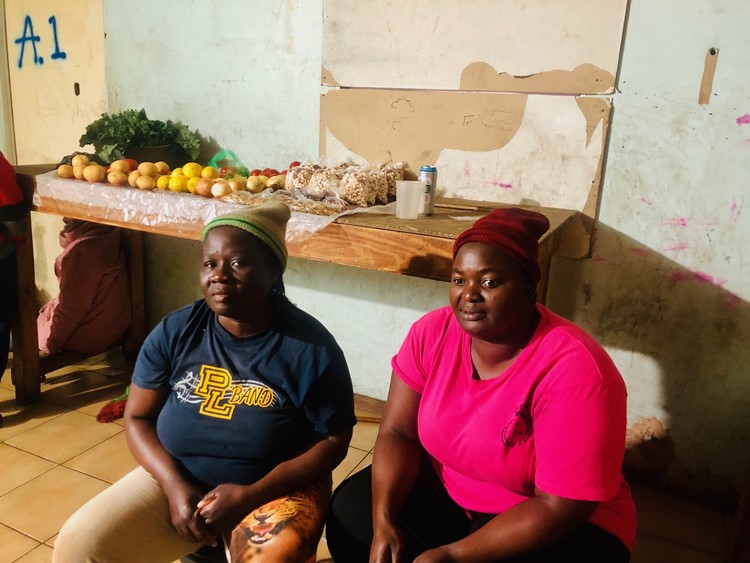
26 February 2025
Princess Mudzimuwaona (left) and Sally Gapare were forcefully evicted by anti-immigration vigilantes in 2022. Photos: Kimberly Mutandiro
“I’m still terrified; I will never forget that day when members of Operation Dudula beat me up and told me to go back to Zimbabwe, forcing me out of my home,” says Margaret Maushe.
A few days before Christmas in 2022, civilians wearing camouflage dress, under the banner of anti-immigrant vigilante group Operation Dudula, violently evicted Maushe from her residence of ten years. Some days before, residents had been handed flyers warning them to vacate.
Maushe was sworn at and slapped in the face by a masked man who also threatened to rape her. She believes she was spared when he realised she uses a wheelchair. She was forced to leave it and other belongings behind, but later a wheelchair was donated to her, though it is not in nearly as good condition.
She now shares a room in one of Joburg’s “dark buildings” with her three children – aged 15, 12 and eight. There’s barely enough space for her belongings. Her 12-year-old son is blind and has been out of school for two years. Maushe begs at traffic lights to pay the bills. People in the hijacked building where she now lives face beatings if they can’t pay rent. At her previous lodgings in Msibi, nobody paid rent.
“Life has been tough for the past two years,” says Maushe.
She is not alone. Sally Gapare used to run a tuckshop in the Msibi building. Her business gave her a sufficient and stable income. She would send money to her children in Zimbabwe. Now she is not even able to visit them.
On the day of the eviction, she was forced to leave everything behind. She says she was also beaten by members of Operation Dudula.
Her asylum documents have expired and she is struggling to renew them.
“Dudula should pay for what it did to us. Life has not been the same since the eviction,” she says.
A space near the toilet in the “dark building” on Saveright Street where people do their laundry.
About 500 families were evicted by anti-immigrant vigilantes from the Msibi building and forced to leave most of their possessions behind, including stock for their businesses. The vigilantes robbed them of their mobile phones, cash and valuables.
Maushe’s family is one of 20 from the Msibi building now living in a “dark building” on Saveright Street, where there are 300 families in total. There are only two toilets. Electricity and water are illegally connected.
In 2023, the families put together a list of damages and losses they suffered with the intention of claiming damages from Operation Dudula, but they could not pay for lawyers.
Before their forced removal, the families were facing an eviction order and were being represented by the Legal Resources Centre (LRC). The matter had been in and out of court for ten years. According to the LRC’s Shaatirah Hassim, the City of Johannesburg was unable to provide alternative accommodation before and since the forced removal.
“We were not able to proceed with the case because we were unable to locate most of the residents who had scattered across the city. But the case can be taken up anytime because the interim court order that prevented the occupants from being evicted without alternative accommodation is still effective,” she said.
The Msibi eviction is one of several evictions and a spate of human rights violations committed against immigrants by Operation Dudula.
The Socio Economic Rights Institute (SERI) started litigation in February 2024, representing Kopanang Afrika Against Xenophobia (KAAX), the Inner City Federation (ICF), Abahlali BaseMjondolo (ABM), and the South African Informal Traders Forum (SAITF).
Operation Dudula is the first respondent, followed by the South African government, police, the departments of Home Affairs, Justice and Correctional Services, Health, and Education, and the South African Human Rights Commission.
According to attorney Asenati Tukela, SERI’s application against Operation Dudula was brought in two parts. Part A being a confidentiality order to protect the names, identities and personal details of the people who deposed into affidavits supporting the application from harassment, attacks, persecution, and repression from members of Operation Dudula.
SERI office, its staff and clients had been victims of harassment and attacks from members of Operation Dudula prior the instituting of the litigation and the Part A order was sought to circumvent this from happening again. Part B of the application entails an interdictory application to declare the actions, operations, campaigns, programs, and initiatives, among other acts, of Operation Dudula unlawful to the extent that they violate section 41 of the Immigration Act 13 of 2002 and further declaring that only an immigration officer or police officer is empowered by provisions of section 41 of the Immigration Act.
The litigation is underway.
Operation Dudula’s Zandile Dabula has not responded to our request for comment.
Margaret Maushe, who uses a wheelchair, now lives with her family in a “dark building” after she was evicted in 2022 by vigilantes.